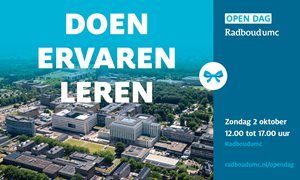
Radboudumc participates in the National Survey on Research Integrity (NSRI), which is being distributed to nearly 40,000 researchers in the Netherlands starting today. The survey seeks to sketch a picture of the issues that can foster or hinder research integrity, such as open science practices, competitiveness, trust in published studies, work pressure, and questionable and responsible research practices. Please fill out the survey!
The survey seeks to sketch as accurate and complete a picture as possible of the issues that can foster or hinder research integrity, such as open science practices, competitiveness, trust in published studies, work pressure, and questionable and responsible research practices.
“We are living in a time when scientific research and outcomes are essential to making decisions that affect the general population and our country’s welfare,” said professor Lex Bouter, project leader for the NSRI. “There is much at stake, and it is imperative that those who are relying on science can also trust our research practices.”
The NSRI is part of and receives funding from the Fostering Responsible Research Practices (FRRP) programme, underwritten by the Dutch ZonMw to conduct “research about research.” ZonMw and its partners are investing a total of 3.8 million euros over five years to realise the four projects, of which the NSRI is one of, in the FRRP programme.
According to FRRP: “By means of the NSRI, we will gain insight into the nature and causes of questionable research practices. The results will be used to implement substantiated improvements.”
Why research integrity – and why now?
“Different to ethics, research integrity generally refers to the principles and standards whose purpose it is to ensure validity and trustworthiness of research,” according to Gowri Gopalakrishna, the post-doc researcher on the NSRI team. “It has become an urgent topic not only in the Netherlands, but also worldwide, especially with the open science movement.”
Accelerated scientific publishing during the Covid-19 pandemic is an example that Bouter, Gopalakrishna and their team have cited as a reason to bring research integrity topics to the front of researchers’ attention, noting that the first four months of the pandemic resulted in much more related scientific publishing than in 2003 with the outbreak of SARS.
“The rapidly increasing number of publications combined with the urgency to quickly understand the new pathogen presents a significant challenge for maintaining the integrity of the underlying evidence base, and to ensure that research is conducted according to global
standards of research integrity,” Gopalakrishna and Bouter argue in a commentary written in June 2020 for British Medical Journal Opinion (1).
The NSRI: scope and results
The NSRI will be distributed by email, via an external research agency, to all academic researchers in the Netherlands beginning on October 15, 2020. Due to the high sensitivity of some topics, the survey will use a technique known as the Randomised Response (RR), which has been shown to elicit more honest answers around sensitive topics. More information about this methodology can be found at https://youtu.be/vvcaziHteAI.
Using the NSRI results, concrete action plans will be developed to strengthen the quality of scientific research, co-created with key stakeholders and in collaboration with an organisation specialised in implementing change.
The first results of the survey are expected to be available in the second quarter of 2021. Once the data have been analysed, the outcomes from the NSRI will be available through preprints, other Open Access publications and through (inter)national conferences. For more information, please see http://www.nsri2020.nl/
Related news items

Joint research in regional hospitals New research projects from promotion fund
22 November 2022Four research projects have been honored in the promotion fund of the Radboudumc and four regional hospitals. The research projects, which are a collaboration between CWZ, Jeroen Bosch Hospital, Rijnstate, Sint Maartenskliniek and the Radboudumc will receive a contribution of 240,000 euros.
go to page
L’Oréal-Unesco For Women in Science grants now open to researchers in Life Sciences and STEM disciplines
8 November 2022The eleventh call for applications of the Dutch L’Oréal-Unesco For Women in Science fellowships opens on 16 January 2023. But this year, it’s a little different: next to researchers in Life Sciences, women working in the STEM disciplines can also apply.
go to page
Take a special look inside Radboudumc on 2 October Open Day for young and old
12 September 2022On Saturday 1 and Sunday 2 October, the Radboud university medical center, Radboud University and the HAN are participating in the 'Weekend van de Wetenschap'. At all locations there are fun and interesting programs for young and old.
go to page
Course on entrepreneurship for PhD candidates and postdocs
19 July 2022Are you thinking about what to do after your PhD? Want to know more about entrepreneurship? This course gives you insight in many aspects of entrepreneurship and research in industry.
go to page

